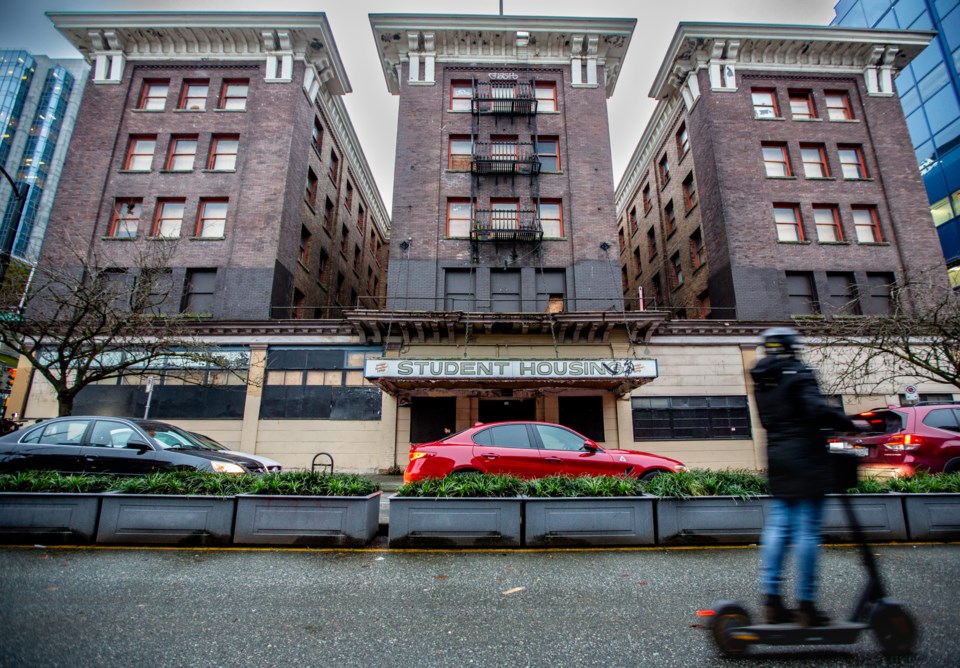Vancouver council was unanimous Wednesday in supporting a recommendation from the city’s chief building official to order the owner of a dilapidated 1908-era building on Dunsmuir Street to demolish it within 21 days.
Saul Schwebs told council of the urgent need to knock down the former hotel at 500 Dunsmuir St., citing numerous concerns about the deteriorating structure, including its imminent collapse.
“This building is in a very unstable condition,” Schwebs said. “We've already seen limited collapse inside. Some of the concerns we have are, is if one more floor lets go, it might take a portion of the wall with it.”
That’s because the floors are framed with joists that are anchored to the walls.
“If one of those things moves, it might take part of the wall with it and lead to a catastrophic collapse of the building,” he continued, adding that his staff is also worried about what a heavy snowfall could do to the building.
The roof, in one corner, has been leaking water for an estimated 10 years.
“It's already stressed because of all the vegetation up there to hold water,” he said.
“If it suffers through a heavy or wet snowfall, we might see the building come down on its own. I'm going to be keeping a very close eye on the weather forecast over the holiday break, believe me.”
A staff report before council Wednesday included an engineering report that detailed structural and hazardous material concerns throughout the five-storey building, which is commonly referred to as Dunsmuir House.
The building contains 167 single rooms and last served as social housing.
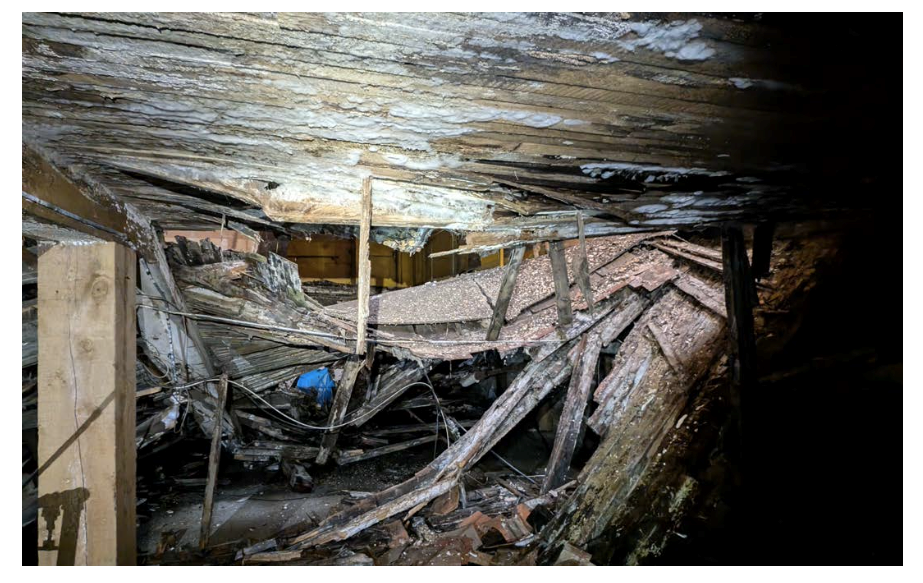
Holborn Group
The building is owned by 500 Dunsmuir Property Ltd., a company controlled by Holborn Group, which is the developer of the Little Mountain site near Queen Elizabeth Park and builder of the former Trump Tower.
No one from the company was present at Wednesday’s meeting, where many councillors took turns criticizing Holborn for not maintaining the building since purchasing it in July 2006.
Coun. Sarah Kirby-Yung successfully requested staff report back on any legal avenues the City of Vancouver may have to seek recourse from Holborn for the “apparent neglect” of the building and loss of heritage.
Kirby-Yung also requested staff explore any avenues council may have to seek compensation from Holborn as part of future rezoning applications that the company may pursue.
“It is really egregious behaviour, and it's incredibly sad, frustrating and disappointing that we have ended up here,” she said.
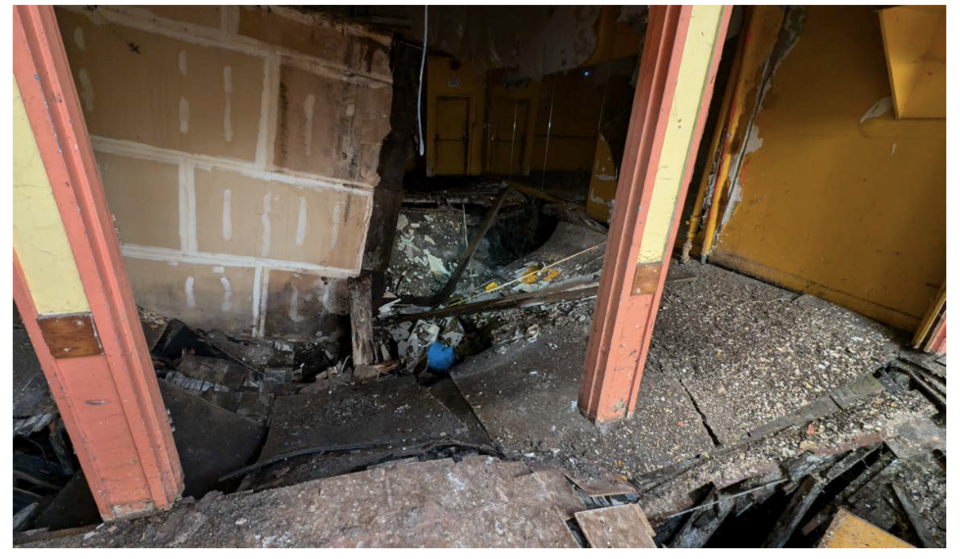
'Struggling to keep track'
What became evident during Schwebs’ presentation to council — and the question-and-answer portion of the meeting — was that the city’s bylaws are currently not written in a way that would prevent such a scenario from occurring again.
The standards of maintenance bylaw does not apply to the Dunsmuir property because the city says the rules in this case are only relevant to occupied buildings. Holborn’s building has been vacant since Nov. 1, 2013.
That “gap,” as it was described by Schwebs and councillors, is what Coun. Lisa Dominato aimed to fill in by successfully requesting staff to look at applying the bylaw to vacant buildings.
Council heard that staff will be convening a task force that focuses on unoccupied buildings, with more details to be announced in the new year. Vancouver police and fire rescue services are expected to participate.
Though the gap in the bylaw was cited, Schwebs also pointed out that he doesn’t have the personnel to comprehensively inspect each vacant building in Vancouver, many of which are of the same vintage as the Dunsmuir property.
“Building owners don't have to report to us when they're vacating a building,” he said.
“We're struggling to keep track of where they are. We're doing some good work that I'm happy to tell you about, if the question comes up. But we're kind of at a loss. We really rely on building owners to maintain their properties.”
City lawyer Grant Murray told council the city’s policies “generally do not prefer that we require somebody to repair a building that they have no intention of reoccupying.”
“It's, A), simply a waste of money and, B), a peculiar thing for the city to be spending its relatively scarce inspection resources on in requiring buildings to be fixed that are no longer occupied or intended to be occupied,” Murray said.
What wasn't clear at Wednesday's council meeting was whether Holborn would have to adhere to the city's single-room-accomodation bylaw, which states that any conversion of a single-room-occupancy building may come with a $300,000 payment per room.
In Holborn's case, such a tab could amount to $50 million.
"It's not a requirement, but it's certainly a legal option," Murray said.
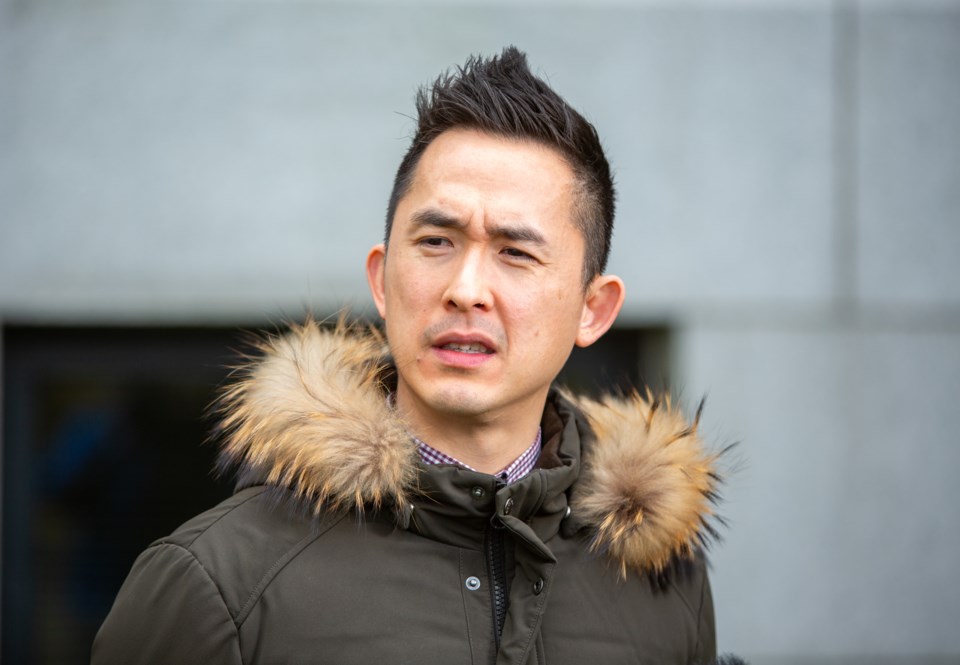
'Political pressure'
Holborn’s CEO, Joo Kim Tiah, wrote a letter Dec. 17 to Mayor Ken Sim and councillors regarding the Dunsmuir property, saying the company’s intention has always been to redevelop the site.
Under Holborn’s ownership, Tiah said the building operated as a rooming house primarily for students until the company was approached by BC Housing in advance of the 2010 Winter and Paralympic Games.
Tiah said there was “political pressure” both from the province and the municipality to ensure that there were fewer homeless people on the street during the Olympics.
“Holborn complied with this request, and at the end of the lease, the building was in such a dilapidated state that it would require approximately $2.6 million in remediation cost to bring the building to a livable/leasable condition,” he said.
“There were negotiations for this cost and Holborn agreed to settle for $475,000 in return for goodwill with both the provincial and municipal government, given that Holborn was involved in a major rezoning project in the city.”
BC Housing leased the building from Sept. 1, 2009 to Oct. 31, 2013.
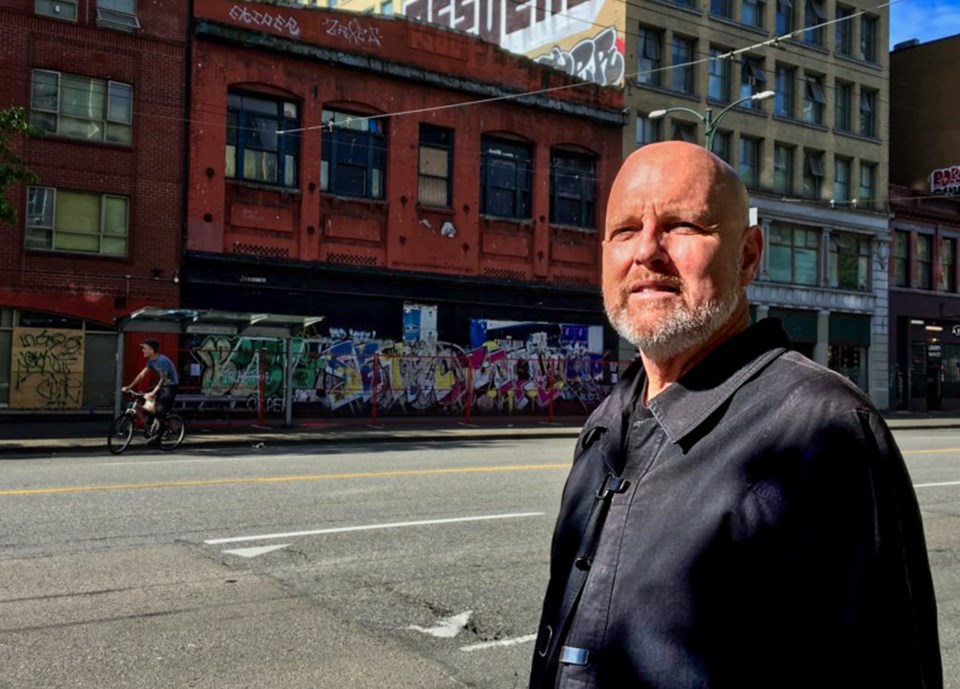
Shayne Ramsay
Former BC Housing CEO Shayne Ramsay said in an email Thursday that the lease of the building was a “stop-gap measure” until 12 city supportive housing sites came on stream, including the Marguerite Ford Apartments on West Second Avenue.
“The building was in poor condition when the lease began in 2009, but provided spaces to bring folks inside,” Ramsay said.
“It seems the condition of the building continued to worsen over the past 11 years when nothing was done by the owner or the city to mitigate the ongoing damage.”
Tiah said the moment BC Housing vacated the site, Holborn took “considerable action” to secure the property, which included bordering up the entire building and hiring 24-hour security.
“We did this while pricing the cost to remediate; however, this did not stop the homeless from constantly breaking into the building and stripping all that had value,” he said.
“Within six months, the walls, wiring and copper were ripped out from the entire building and the estimates to repurpose this building had grown to approximately $4 to $5 million.”
The break-ins continued for several years.
“There have been many occasions that we had worked with the Vancouver Police Department (VPD) but to no avail as it was like playing whack-a-mole as [the homeless] would creatively find a way to enter the building,” Tiah said.
'No financial sense'
The cost to remediate continued to escalate over the years and a report that Holborn commissioned approximately five years ago estimated the cost at $10 to 15 million.
“Holborn was put in a situation where it made no financial sense to reinvest money into the building, rather wanting to put the money towards a new development that would be of greater benefit to the neighbourhood and community,” he said.
“Holborn made the choice to push as quickly as possible with the redevelopment plans instead of reopening the building.”
That included a “rezoning concept” presented to the city’s director of planning and staff on May 18, 2017. A “letter of enquiry application” was submitted Dec. 20, 2019, and a “policy enquiry process” was submitted Nov. 1, 2022.
“Unfortunately, all three of these efforts did not receive support from city staff and were never presented to mayor or council for their consideration,” said Tiah, adding that throughout the process with the city that Holborn “was always in correspondence with the city's fire and police department with regards to public safety.”
Tiah said it was not until August 2024 that Holborn noticed the collapse of certain floors and immediately commissioned an independent structural report, which was done by Weiler Smith Bowers.
“That report concluded that the building should not be occupied and that action for removal should be considered,” he said. “This report did not state that the building was a safety hazard that needed to be demolished right away.”
Tiah said Holborn was cooperative with Schwebs when his office requested access to inspect the building.
“It is unfortunate that it has come to this, but we respect the conclusion and recommendation of the city's building inspector to demolish the building and will act accordingly in a timely manner,” Tiah said.
Added Tiah: “Holborn is deeply committed to Vancouver — not only as developers but as community members — we live here, we are raising our families here and believe we have an important contribution to make. We look forward to continuing our work with the city to redevelop the site in a timely manner.”
Schwebs told council he was confident that Holborn would arrange for demolition and cover the costs. The demolition will not be done brick by brick, but knocked down with a high-reach excavator.
Portions of Dunsmuir and Richards streets will need to be temporarily closed.
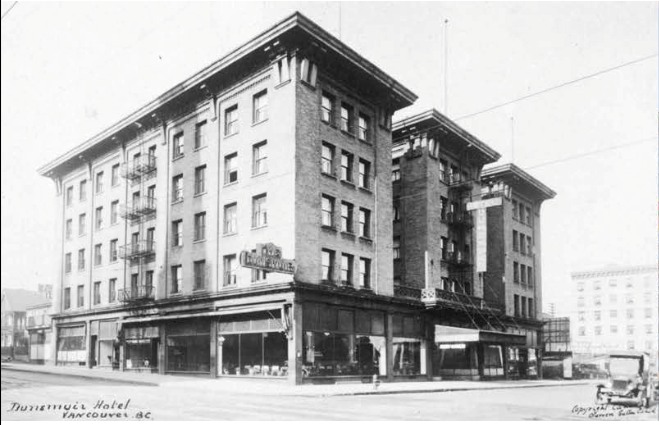
'A loss for our city'
The building was designed by Parr & Fee and built in 1908 by contractor David Gibb. It was originally built as a hotel, but later used as barracks for sailors during the Second World War.
After the war, the building was converted into a hostel to help house returning veterans. Shortly after, the Salvation Army took over operations and managed the building as a men’s shelter before becoming student housing and then social housing.
The building is listed on the heritage registry, but is not otherwise subject to heritage protection. Council heard efforts will be made to preserve the building’s cornices, and to be possibly used in redevelopment of the site.
Coun. Peter Meiszner lamented the impending loss of the building and other turn-of-the-century-area heritage properties such as the Georgia Medical-Dental and Birks buildings that have been demolished over the years in Vancouver.
“This was once a beautiful historic building in our city that operated as a hotel for decades,” he said of the property. “Looking at some of the old pictures in the archives, you can see that there was a lot of pride in this particular building, and it was a beautiful building.”
Added Meiszner: “This is an unfortunate outcome, and this really is a loss for our city. So I'm saddened to see that, and quite frustrated that we're being put in this situation.”
